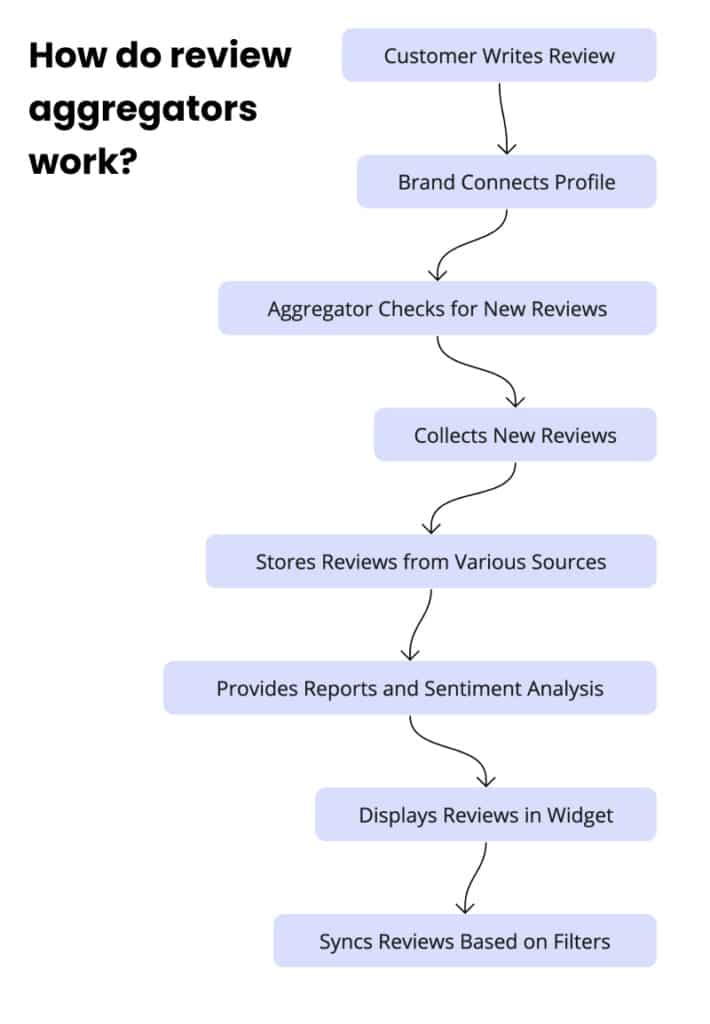Company Review Aggregators: The Power of Customer Insights
In today’s digital world, customers are the heart of any business. Their feedback, opinions, and experiences shape a company’s reputation and can determine its success. Company review aggregators have become invaluable tools for both consumers and businesses alike. These platforms gather and display reviews from multiple sources in one place, allowing customers to make informed decisions and businesses to improve their offerings.
This article will explore the importance of review aggregators, how they work, and why they are essential for both businesses and consumers. We’ll also discuss how businesses can leverage these platforms to enhance their customer relationships and boost their credibility.

What is a Company Review Aggregator?
A review aggregator is a platform that collects reviews from various sources such as social media, third-party review sites, and customer feedback surveys. It consolidates these reviews into a single, easily accessible location for consumers and businesses to evaluate.
These aggregators provide an overview of a company’s reputation, allowing customers to read a variety of perspectives in one place. Popular examples include Google Reviews, Yelp, and Trustpilot.
Why Are Company Review Aggregators Important?
Company review aggregators offer several key benefits for both businesses and consumers. Here are some reasons why they are vital:
-
Centralized Information: Instead of visiting multiple websites, consumers can access all the reviews in one place, saving time and effort.
-
Transparency and Trust: Customers are more likely to trust a company with a high volume of reviews across multiple platforms. Positive reviews on review aggregator platforms can increase trust and credibility.
-
Improved Decision Making: Consumers rely on reviews to make purchasing decisions. A review aggregator helps them quickly assess the quality of a product or service.
-
Feedback for Improvement: Businesses benefit from constructive feedback on review aggregator platforms. Negative reviews can highlight areas for improvement, while positive reviews validate the business’s strengths.
Popular Review Aggregator Platforms
There are many review aggregator platforms available, each with its own features and audience. Some of the most well-known platforms include:
-
Google Reviews: The most widely used review aggregator, integrating customer feedback directly into search results and Google Maps.
-
Trustpilot: A platform that collects consumer reviews from businesses of all types, with a focus on user experience and service quality.
-
Yelp: Well-known for restaurant and local business reviews, Yelp has expanded into various industries.
-
Facebook Reviews: Facebook has become an important platform for customer reviews, offering valuable insights through its integrated review system.
-
Amazon: While primarily an e-commerce platform, Amazon also aggregates product reviews, providing customers with detailed feedback on items they wish to purchase.
Each of these platforms serves as an aggregator that helps businesses and consumers make better decisions by aggregating reviews from different sources into one comprehensive listing.

How Do Review Aggregators Work?
Review aggregators use advanced algorithms and API integrations to collect data from various sources. These platforms gather reviews from third-party review sites, social media channels, and even company websites. Once the reviews are collected, they are organized and presented in a clear, user-friendly format.
Key Features of Review Aggregators:
-
Review Collection: Aggregators automatically collect and categorize reviews from different platforms.
-
Sentiment Analysis: Some aggregators use AI-powered sentiment analysis to determine the overall tone of the reviews, categorizing them as positive, negative, or neutral.
-
Rating Display: Reviews are often displayed as an average rating, making it easy for users to assess a company’s performance at a glance.
-
Customizable Widgets: Many aggregators offer widgets that companies can embed on their websites, showcasing their ratings and reviews.
Benefits of Using Review Aggregators
For businesses and customers alike, review aggregators provide a wide range of advantages:
For Consumers:
-
Comprehensive Overview: Review aggregators provide a comprehensive overview of a company, highlighting both positive and negative reviews.
-
Time-Saving: Consumers no longer need to jump between different websites to gather information about a company’s reputation.
-
Trust and Transparency: A business with positive reviews across multiple platforms is more likely to be trustworthy.
For Businesses:
-
Brand Credibility: Positive aggregated reviews increase trust and can boost brand credibility.
-
Customer Insights: Reviews offer valuable insights into customer expectations and pain points, which businesses can use to improve their offerings.
-
Improved SEO: Having aggregated reviews on platforms like Google can improve a business’s SEO rankings, as search engines tend to prioritize review-rich content.
How to Use Review Aggregators for Business Growth
Businesses can leverage review aggregators to boost their visibility, improve customer relations, and enhance their brand image. Here are some strategies for using review aggregators effectively:
1. Monitor and Respond to Reviews
It’s essential to actively monitor reviews across aggregator platforms. Responding to both positive and negative feedback shows customers that the business cares about their opinions. Addressing complaints can even turn a negative experience into a positive one.
2. Leverage Positive Feedback
Highlight positive reviews by sharing them on your company’s website or social media channels. Positive reviews can be used in marketing materials, creating social proof and attracting more customers.
3. Request Feedback from Customers
Encourage satisfied customers to leave reviews. Directly asking for feedback, whether through email or on your website, can increase the number of reviews you have on aggregator platforms.
4. Use Insights to Improve Services
Analyze the feedback provided on these platforms. Use both positive and negative comments to refine your products, services, and customer service approach.

FAQs About Company Review Aggregators
1. How can review aggregators improve my business?
Review aggregators consolidate feedback from various platforms, making it easier for customers to assess your business. Positive reviews enhance your reputation, and negative reviews provide insights into areas for improvement.
2. Are all review aggregators the same?
No, each platform has its own focus and target audience. Google Reviews, for example, is more search-oriented, while Yelp is focused on local businesses. Choose the aggregator that aligns best with your industry.
3. Can I control reviews on aggregator platforms?
No, businesses cannot control the reviews submitted by customers. However, businesses can respond to reviews and use the feedback to improve their offerings.
4. Do review aggregators affect SEO?
Yes, review aggregators can impact SEO. Search engines often prioritize businesses with positive reviews, especially when those reviews appear on high-authority platforms like Google Reviews and Trustpilot.
Conclusion
Company review aggregators are powerful tools for businesses and consumers alike. They offer a centralized platform to view and share feedback, helping customers make informed decisions and allowing businesses to gain valuable insights into their strengths and weaknesses. By leveraging these platforms, businesses can improve their reputation, enhance customer trust, and drive growth.
Whether you’re looking for reviews to help you choose a product or service, or you’re a business owner striving to improve your brand’s credibility, understanding and using review aggregators can have a significant impact on your success.
For more tips on leveraging customer feedback, check out our guide on enhancing customer relations.



